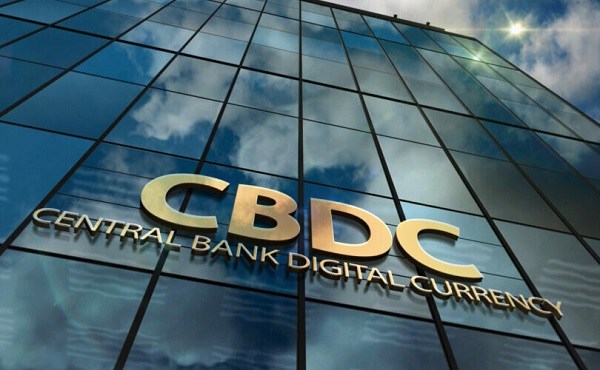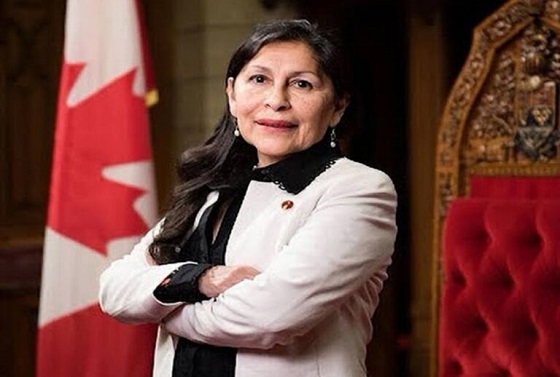Banks
International Monetary Fund paper suggests CBDCs could turn society cashless

From LifeSiteNews
A working paper by the International Monetary Fund suggests that cash may disappear from society entirely once central bank digital currencies become mainstream.
Digital currencies like CBDCs could make cash extinct, whether by design or through market preference, according to an IMF working paper.
With widespread digital currency adoption, cash may go the way of the dodo bird, and it would be “challenging and costly” to revive it if a society were to go fully cashless, according to the IMF working paper, Could Digital Currencies Lead to the Disappearance of Cash from the Market? by Marco Pani and Rodolfo Maino.
The disappearance of cash, according to the authors, could come about either through direct policy or as a natural part of innovation and digital currency adoption.
They say that “the introduction of a DC [Digital Currency] in a diverse payment ecosystem—comprising cash, traditional payment cards, and modern electronic money—where the use of physical cash has already declined significantly, could lead to the complete disappearance of cash, even if such an outcome were not an intentional policy objective.”
READ: Financial expert warns all-digital monetary system would enable ‘complete control’ of citizens
The authors looked at how merchants and customers use physical cash and cards, and simulated how the introduction of digital currencies could either complement cash and cards or wipe them out completely.
According to the report, the introduction of a new currency can alter the market equilibrium in several qualitatively different ways:
- It may displace one of the exiting currencies (either cash or cards);
- It may replace both currencies; or
- It may continue to be used indefinitely alongside the other two currencies.
"You could have a potentially […] darker world where the government decides that [CBDC] can be used to purchase some things, but not other things that it deems less desirable like say ammunition, or drugs, or pornography, or something of the sort": Eswar Prasad, WEF #AMNC23 pic.twitter.com/KkWgaEWAR5
— Tim Hinchliffe (@TimHinchliffe) June 28, 2023
Programmable digital currencies like Central Bank Digital Currencies (CBDCs) cannot operate without pegging every user to a digital identity.
What’s more, these programmable digital currencies can be controlled remotely, so that taxes and fines could automatically be taken out of accounts, or so that restrictions could be placed on what you could buy, where you could buy it and when.
Last year, the IMF published a policy brief acknowledging that CBDCs could be used for state surveillance while posing risks to privacy and cybersecurity that could undermine trust in central bank money.
According to the November 2024 IMF brief, Central Bank Digital Currency: Progress And Further Considerations:
CBDC, as a digital form of central bank money, may allow for a ‘digital trail’—data—to be accessed, collected, processed and stored.
In contrast to cash, CBDC could be designed to potentially include a wealth of personal data encapsulating transaction histories, user demographics, and behavioral patterns.
Personal data could establish a link between counterparty identities and transactions.
While the IMF acknowledges the risks to privacy, the potential for government surveillance, and how public and private entities could leverage user data for nefarious means, it is still plowing ahead with a CBDC Handbook for central banks and governments to follow during their rollouts.
READ: International Monetary Fund ‘working hard’ on a global Central Bank Digital Currency platform
The IMF consistently says that digital currencies should be complementary to physical cash and to not replace it, but all signs point towards the erosion of cash over time, whether through convenience or coercion — carrot or stick.
Speaking at the World Economic Forum’s (WEF) Special Meeting on Global Collaboration, Growth and Energy Development last year, Central Bank of Bahrain governor Khalid Humaidan told the panel “Open Forum: The Digital Currencies’ Opportunity in the Middle East” that one of the goals of CBDC was to replace cash, at least in Bahrain, and to go “one hundred percent digital.”
"We're probably going to stop calling it central bank digital currency [CBDC]. It's going to be a digital form of cash, and at some point in time hopefully we will be able to be 100% digital": Central Bank of Bahrain Governor Khalid Humaidan to the WEF https://t.co/Pspr0M1Uuq pic.twitter.com/N5aOkCpzh1
— Tim Hinchliffe (@TimHinchliffe) April 29, 2024
“If we think cash is the analogue and digital currency is the form of digital — CBDC is the digital form of cash — today, clearly we’re in a hybrid situation; we’re using both,” said Humaidan.
We know in the past when it comes to cash, central bankers were very much in control with all aspects of cash, and now we’re comfortable to the point where the private sector plays a big role in the printing of the cash, in the distribution of the cash, and with the private sector we use interest rates to manage the supply of cash.
The same thing is likely to happen with CBDC. Yes, the central bank will have a role, but at some point in time — the same way we don’t call it ‘central bank cash’ — we’re probably going to stop calling it central bank digital currency.
It’s going to be a digital form of the cash, and at some point in time hopefully we will be able to be one hundred percent digital.
"Is it [digital euro] going to be as private as cash? No. A digital currency will never be as anonymous and as protecting of privacy in many respects as cash, which is why cash will always be around": Christine Lagarde, BIS Innovation Summit, March 2023 #CBDC pic.twitter.com/BLMVOPax6a
— Tim Hinchliffe (@TimHinchliffe) April 11, 2023
While the IMF advises to not eliminate cash altogether, central banks and governments are already moving in that direction.
Furthermore, a WEF Agenda blog post from September, 2017 lists the “gradual obsolescence of paper currency” as being “characteristic of a well-designed CBDC.”
If cash were to go extinct, the latest IMF working paper warns, “reintroducing cash in a non-cash system would be challenging and costly.”
Therefore, the authors conclude:
To safeguard the continued utilization of cash and to uphold the equilibrium of the payment system, the study advocates for a proactive policy approach and for the implementation of measures aimed at ensuring the sustained relevance of physical currency, especially in scenarios where the introduction of new digital currencies might inadvertently lead to the extinction of traditional cash.
The IMF working paper Could Digital Currencies Lead to the Disappearance of Cash from the Market? was published on the IMF website in March 2025; however, the paper was first published in the International Advances in Economic Research journal on February 19, 2024 under its original title, Could CBDCs Lead to Cash Extinction? Insights from a ‘Merchant-Customer’ Model.
Reprinted with permission from The Sociable.
Note from LifeSiteNews co-founder Steve Jalsevac: This article is a must-read and view for all readers because of the profound personal impact a digital economy would have on every individual and every family.
The great Catherine Austin Fitts has strongly recommended that every citizen use cash as much as possible for purchases. She says that if millions did this, it would delay, if not stop, a forced digital economy. She should know. Fitts emphasizes, “In a highly leveraged financial system such as we have, a single individual counts for a lot.”
See her article, I Want to Stop CBDCs – What Can I Do
The increased use of credit and debit cards, including phone and other digital payment systems, is tempting because of their convenience. Still, it is also your cooperation in building your economic prison and total control of all that you say and do, where and when you travel, what you buy or subscribe to, and so on. We are facing a totalitarian control that has never before been experienced in human history. It is beyond frightening.
Carrying and using cash for purchases, and refusing to purchase anything from shops, restaurants or other services that do not accept cash or checks, is inconvenient and requires a little effort, commitment and some degree of courage.
Banks
The Bill Designed to Kill Canada’s Fossil Fuel Sector

From Energy Now
By Tammy Nemeth and Ron Wallace
REALITY: Senator Galvez’s BILL S-238 would force every federally regulated bank, insurer, pension fund and Crown financial corporation to treat the financing of oil, gas, and coal as an unacceptable systemic risk and phase it out through “decommissioning.”
Prime Minister Mark Carney has spent the past weeks proclaiming that Canada will become an “energy superpower” not just in renewables but in responsible conventional energy as well. The newly created Major Projects Office has been proposed to fast-track billions in LNG terminals, transmission lines, carbon-capture hubs, critical-mineral mines, and perhaps oil export pipelines. A rumored federal–Alberta Memorandum of Understanding is said to be imminent from signature, possibly clearing the way for a new million-barrel-per-day oil pipeline from Alberta to British Columbia’s north coast. The message from Ottawa is clear: Canada is open for energy business. Yet quietly moving through the Senate is legislation that would deliver the exact opposite outcome.
Senator Rosa Galvez’s reintroduction of her Climate-Aligned Finance Act, now Bill S-238, following the death of its predecessor Bill S-243 on the order paper, is being touted by supporters not only as a vital tool for an “orderly transition” to a low-carbon Canadian economy but also to be “simply inevitable.” This Bill does not simply ask financial institutions to “consider” climate risk it proposes to re-write their core mandate so that alignment with the Paris Agreement’s 1.5 °C target overrides every other duty. In fact, it would force every federally regulated bank, insurer, pension fund and Crown financial corporation to treat the financing of oil, gas, and coal as an unacceptable systemic risk and phase it out through “decommissioning.” For certainty this means to:
“(i) incentivize decommissioning emissions-intensive activities, diversifying energy sources, financing zero-emissions energy and infrastructure and developing and adopting change and innovation,
(ii) escalate climate concerns regarding emissions-intensive activities of financially facilitated entities and exclude entities that are unable or unwilling to align with climate commitments, and
(iii) minimize actions that have a climate change impact that is negative.”
As discussed here in May, the reach of the Climate Aligned Finance Act is vast, targeting emissions-intensive sectors like oil and gas with a regulatory overreach that borders on the draconian. Institutions must shun financing and support of emissions-intensive activities, which are defined as related to fossil fuel activities, and chart a course toward a “fossil-free future.” This would effectively starve Canada’s energy sector of capital, insurance, and investment. Moreover, Directors and Officers are explicitly required to exercise their powers in a manner that keeps their institution “in alignment with climate commitments.” The Bill effectively subordinates traditional financial fiduciary responsibility to climate ideology.
While the new iteration removes the explicit capital-risk weights of the original Bill (1,250% on debt for new fossil fuel projects and 150% or more for existing ones) it replaces those conditions with directives for the Office of the Superintendent of Financial Institutions (OSFI) to issue guidelines that “account for exposures and contributions to climate-related risks.” This shift offers little real relief because mandated guidelines would still require “increased capital-risk weights for financing exposed to acute transition risks,” and the “non-perpetuation and elimination of dependence on emissions-intensive activities, including planning for a fossil-fuel-free future.”
These provisions would grant OSFI broad discretion but steer it inexorably toward punitive outcomes. As the Canadian Bankers’ Association and OSFI warned in their 2023 Senate testimony on the original Bill, such mechanisms would likely compel Canadian lenders to curtail or abandon oil and gas financing.
In plain language, Ottawa would be directing the entire financial system to stop lending to, insuring or investing in the very industries that are central to Canada’s economic future. In addition to providing tens of billions in royalties and taxes to governments each year, the oil and gas sector contributes about 3–3.5% of Canada’s GDP, generates over $160 billion in annual revenue and accounts for roughly 25% of Canada’s total exports.
The governance provisions proposed in Bill S-238 are beyond the pale. Board members with any past or present connection to the fossil fuel industry would have to declare it annually, detail any associations or lobbying involving “organizations not in alignment with climate commitments,” recuse themselves from every discussion or vote involving investments in oil, gas or coal, and make these declarations within a Climate Commitments Alignment Report. While oil and gas expertise is not banned outright, it is nonetheless ‘quarantined’ in ways that create a de facto purity test in the boardroom. At the same time, every board must appoint at least one member with “climate expertise”. Contrary to long-established principles for financial management, while seasoned energy experts would not be banned outright from such deliberations, they would effectively be sidelined on the very investment files where their expertise would be most valued.
The contradictions posed by Bill S-238 are simply breathtaking. The Major Projects Office is promising 68,000 jobs and CAD$116 billion in new investment, much of it tied to natural gas and oil-related infrastructure. These new pipeline and LNG export projects will require material private capital investments. Yet under Bill S-238 any bank that provides the capital needed for the projects would face escalating, punitive capital requirements along with public disclosure of its “contribution” to climate risks that are to be declared annually in a “Climate Commitments Alignment Report.” No MoU, Indigenous loan guarantee or federal permit can conjure financing out of thin air once Canada’s banks and insurers have effectively been legally compelled to exit the fossil fuel energy sector.
Current actions constitute a clear warning about the potential legal consequences of Bill S-238. Canada’s largest pension fund is currently being sued by four young Canadians who claim the Canada Pension Plan Investment Board (CPPIB) is failing to properly manage climate-related financial risk. Alleged are breaches of fiduciary duty through fossil fuel investments that are claimed to exacerbate climate risks and threaten ‘intergenerational equity’ with the demand that the CPP divest from fossil fuels entirely. The case, filed in Ontario Superior Court, demonstrates how financial institutions may be challenged in their traditional roles as stewards of balanced economic growth and instead used as agents for enforced decarbonization. In short, such legislation enables regulatory laws to re-direct, if not disable, capital investment in the Canadian non-renewable energy sector.
In May 2024, Mark Carney, then Chair of Brookfield Asset Management Inc. and head of Transition Investing, appeared at a Senate Committee hearing. He lauded the original Bill, calling key elements “achievable and actually essential” to champion “climate-related financial disclosures.” He noted that: “Finance cannot drive this transition on its own. Finance is an enabler, a catalyst that will speed what governments and companies initiate.” However, the new revised Bill S-238 goes far beyond disclosure. Like its previous iteration, it remains punitive, discriminatory and economically shortsighted, jeopardizing the very economic resilience that Carney has pledged to fortify. It is engineered debanking dressed up as prudential regulation.
This is at a time in which Richard Ciano described Canada as a land of “investment chaos”:
“While investment risk in the United States is often political, external, and transactional, the risk in Canada is systemic, legal, and structural. For long-term, capital-intensive projects, this deep, internal rot is fundamentally more toxic and unmanageable than the headline-driven volatility of a U.S. administration.
If the “rule of law” in Canada is meant to provide the certainty and predictability that capital demands, it is failing spectacularly. Investors seek clear title and dependable contracts. Canada is increasingly delivering the opposite. Investors don’t witness stability — they witness a fractured federation, a weaponized bureaucracy, and a legal system that injects profound uncertainty into the most basic elements of capitalism, like property rights.”
Bill S-238 is yet another example of how Canada is imposing unrealistic laws and regulations that contribute to investment uncertainty and that directly contradict policies proposed to accelerate projects in the national interest. While the Carney government trumpets Canada as a future energy superpower that produces and exports LNG, responsibly produced “decarbonized” oil and critical minerals, Bill S-238 would effectively limit, if not negate, the crucial financial backing and investments that would be required to accomplish this policy objective.
Rhetoric about nation-building projects is cheap. Access to capital is what turns promises into steel in the ground. This Bill would ensure that one hand of government will be quietly strangling what the other hand is proposing to do in the national interest.
Tammy Nemeth is a U.K.-based energy analyst. Ron Wallace is a Calgary-based energy analyst and former Member of the National Energy Board.
Agriculture
Federal cabinet calls for Canadian bank used primarily by white farmers to be more diverse

From LifeSiteNews
A finance department review suggested women, youth, Indigenous, LGBTQ, Black and racialized entrepreneurs are underserved by Farm Credit Canada.
The Cabinet of Prime Minister Mark Carney said in a note that a Canadian Crown bank mostly used by farmers is too “white” and not diverse enough in its lending to “traditionally underrepresented groups” such as LGBT minorities.
Farm Credit Canada Regina, in Saskatchewan, is used by thousands of farmers, yet federal cabinet overseers claim its loan portfolio needs greater diversity.
The finance department note, which aims to make amendments to the Farm Credit Canada Act, claims that agriculture is “predominantly older white men.”
Proposed changes to the Act mean the government will mandate “regular legislative reviews to ensure alignment with the needs of the agriculture and agri-food sector.”
“Farm operators are predominantly older white men and farm families tend to have higher average incomes compared to all Canadians,” the note reads.
“Traditionally underrepresented groups such as women, youth, Indigenous, LGBTQ, and Black and racialized entrepreneurs may particularly benefit from regular legislative reviews to better enable Farm Credit Canada to align its activities with their specific needs.”
The text includes no legal amendment, and the finance department did not say why it was brought forward or who asked for the changes.
Canadian census data shows that there are only 590,710 farmers and their families, a number that keeps going down. The average farmer is a 55-year-old male and predominantly Christian, either Catholic or from the United Church.
Data shows that 6.9 percent of farmers are immigrants, with about 3.7 percent being “from racialized groups.”
National census data from 2021 indicates that about four percent of Canadians say they are LGBT; however, those who are farmers is not stated.
Historically, most farmers in Canada are multi-generational descendants of Christian/Catholic Europeans who came to Canada in the mid to late 1800s, mainly from the United Kingdom, Ireland, Ukraine, Russia, Italy, Poland, the Netherlands, Germany, and France.
-

 Business1 day ago
Business1 day agoBlacked-Out Democracy: The Stellantis Deal Ottawa Won’t Show Its Own MPs
-

 Alberta2 days ago
Alberta2 days agoPremier Danielle Smith says attacks on Alberta’s pro-family laws ‘show we’ve succeeded in a lot of ways’
-

 Agriculture1 day ago
Agriculture1 day agoHealth Canada pauses plan to sell unlabeled cloned meat
-

 Artificial Intelligence2 days ago
Artificial Intelligence2 days agoGoogle denies scanning users’ email and attachments with its AI software
-

 Alberta2 days ago
Alberta2 days agoNew pipeline from Alberta would benefit all Canadians—despite claims from B.C. premier
-

 Crime1 day ago
Crime1 day agoB.C.’s First Money-Laundering Sentence in a Decade Exposes Gaps in Global Hub for Chinese Drug Cash
-

 COVID-192 days ago
COVID-192 days agoCrown seeks to punish peaceful protestor Chris Barber by confiscating his family work truck “Big Red”
-

 International1 day ago
International1 day agoAmerica first at the national parks: Trump hits Canadians and other foreign visitors with $100 fee






